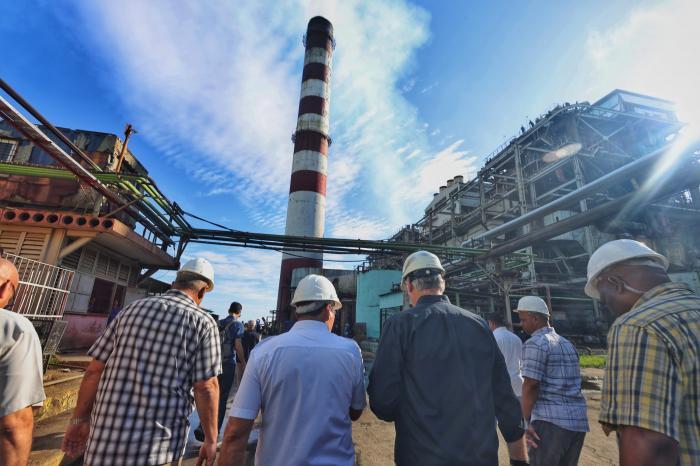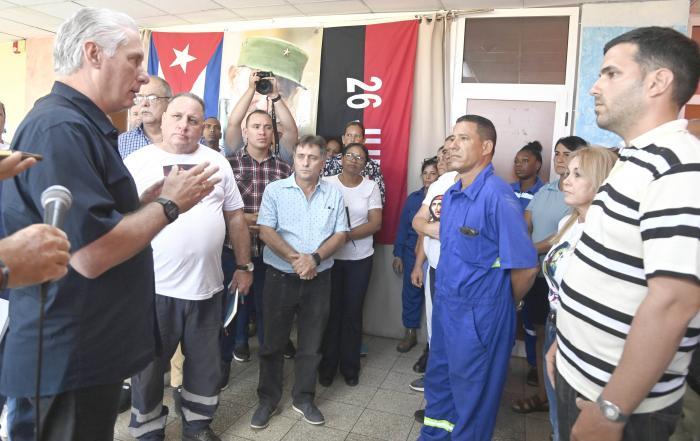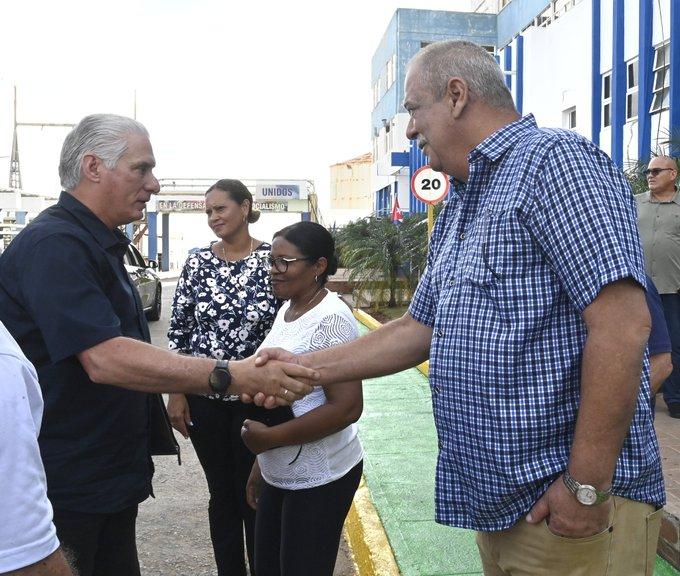
MATANZAS.- "Much of what the country achieves has to do with what you achieve here, in Guiteras," said Miguel Díaz-Canel Bermúdez, First Secretary of the Central Committee of the Communist Party and President of the Republic, last Saturday, in a conversation with a representative of the workers' collective at the emblematic Antonio Guiteras Thermoelectric Plant.
The visit was part of a tour that began last Friday, during which the president will visit all of the country's thermoelectric plants to evaluate, along with their employees and managers, the progress of the National Electric System (SEN, for its Spanish acronym)'s generation capacity recovery program.
Given the urgency of starting capital maintenance at Guiteras, scheduled for December, the President emphasized the urgency of this action, which must be well prepared for high-quality implementation. He also emphasized the need to work across the country to restore as much generation as possible before Guiteras decommissions, in order to reduce the impact that the absence of this important plant would have.
According to the explanation offered by Rubén Campos Olmo, general director of the thermoelectric plant, this type of intervention should be carried out every seven or eight years, according to technical standards, as it is crucial for basic equipment such as boilers, turbines, generators, and transformers. The one scheduled for the end of 2025 is the first in 15 years, he added.
Prior to its execution, the main tasks have been organized to maintain electricity generation with the greatest possible availability, reliability, and efficiency until the major repairs begin.
Campos Olmo explained that two variants have been designed. The first seeks to repair at least basic equipment to increase reliability; while the second, more far-reaching, is based on the planned shutdown scheduled for 180 days.
Among other work objectives, the project includes partial or major chimney repairs, replacement of condenser tubes, major maintenance of regenerative air heaters, and repair of high-pressure heaters.
Guiteras, the country's largest unitary block and therefore vital to the operation of the SEN, is currently generating 226 MW due to a failure in one of its essential components, which leaves it below its maximum capacity of 250 MW.
The limitation, the Director General explained to President Díaz-Canel, is due to a problem with the high-temperature reheater, which consists of a set of pipes that have become thinner over the years. This failure, he explained, forces the diversion of some of the steam that should be going to the turbine, forcing a reduction in operating load.
Faced with this situation, compounded by the economic complexities Cuba is experiencing, Campos Olmo highlighted the resilience of the group of just over 400 workers there, who continue to fight, committed to the people.
He also highlighted the development of a strong ANIR movement, as part of which "we are constantly updating the plant's problem database," as well as the strengthening of collaborative ties with the University of Matanzas, not only in terms of student training but also to increase the training of the thermoelectric plant's workers.
The director also referred to the measures being implemented at the center as part of the Government Program for the recovery of the SEN, related to salary increases, food and hygiene supplies, as well as specialized medical care, among other essential support.
"It is very stimulating to visit this emblematic Antonio Guiteras thermoelectric plant and appreciate the level of commitment and responsibility of its workforce to recover the plant's generating capacity and contribute to the necessary and urgent stabilization of the National Electric System. We have full confidence that they will achieve their proposed objectives," the president wrote in the visitors' book at the plant, founded in 1988.

THE BIGGEST OBSTACLE
In statements to the press, the Director General of the thermoelectric plant categorically pointed to the U.S. government's economic, commercial, and financial blockade as the factor that most impacts the entity's operations, which he described as the Cuban industry most affected by this.
In this regard, he recalled how, starting in 2015, when the American General Electric Company purchased the French company Alstom—the original firm that designed and assembled Guiteras—they lost access to a French loan that channeled all supplies and spare parts. Since then, the process has become extremely complex.
Among other examples, he mentioned the difficulties in finding banks in Europe, including in Paris, willing to work with Cuba, due to the risk of multimillion-dollar fines.
He also mentioned the retention of equipment, as happened with two pumps in Jamaica, due to the manufacturer being forced to remove a U.S.-made part before shipping them to Cuba, which generated significant costs and delays.
He also detailed that a variable speed drive, valued at one million dollars, already paid for and manufactured, was held and not delivered, requiring a refund. He added that, since May, the delivery of special valves of US origin, crucial to the operation of the system and compliance with maintenance plans, has been repeatedly postponed.
















